The Fragile Curtain
The first time I left the States it was the summer of my sixteenth year; I traveled to Mexico, taking the train from Chicago to Mexico City to attend a Congress on World Evangelization sponsored by Youth for Christ. The train was filled YFC leaders and lots of eager teens (and my mother, secretary to the Overseas Director, who probably would not have let me go without her.) I remember at one train stop, watching as a mother pushed her toddler, a little girl, to beg. “Cinco, cinco,” said the child, dirty and barefooted, twisting her hand back and forth as she implored us. “Cinco, cinco.” I had never seen a child begging before, nor a mother nudging her child to beg. I was never the same; it was a seminal moment. I came home a transformed teenager. I had begun to develop a worldview. In their book When Helping Hurts, authors Corbett and Fikkert define a worldview as the “total set of beliefs or assumptions that comprise the mind-set of an individual and determine what they believe and how they behave.” And I would add: If what we say we believe does not determine how we behave then we don’t really believe what we say we believe. Go ahead. Read that underlined sentence again. If what we say we believe does not determine how we behave, then we don’t really believe what we say we believe. In other words, our actions, the way we live our lives, reveals what the total set of beliefs or assumptions that comprise our mindset is. Do you really believe?—check out how you live. My worldview has been determined by radical experiences that pulled me outside my comfort zone. I was a naive, underexposed, suburban, conservative Christian, who had absorbed a faith strongly influenced by culture and Western assumptions—I was an economically, racially, class-influenced and woefully ignorant human being. I never forgot that little child begging—“Cinco! Cinco!”—by the train tracks in Mexico that I had seen when I was a girl of 16. David and I headed into the inner city in 1966, first to serve at Moody Memorial Church, then when we realized the evangelical church was abandoning those neighborhoods where the demographics were changing racially, we founded a church on the west side of the city—Circle Church. Everything about these years was exhilarating, discomfiting, challenging, enervating, exhausting, and radicalizing. The feminist movement challenged my preconceptions about the role of women in Christendom. The civil-rights movement, turning during those years from passive resistance into militancy, forced us to pay attention to our own stereotypes and hidden racism. Riots and the cities burning. Assassinations of political leaders—JFK, King and Robert Kennedy. The Vietnam War and anti-war protests. Hippies on the streets. The drug culture and the free-sex movement—our dialogue about issues of faith in the inner city was very different from the dialogue I had grown up with as a child. I read Illinois Senator Paul Simon’s work on the economics of poverty and realized the power of systemic ill that keeps people from rising out of their sinkholes—it is not just a matter of raising yourself up by your bootstraps. Living in Chicago in the ’70s completely shifted my worldview—and everything I learned during those years has been the foundation for my adult development. Exposing myself to dialogue (some of it we couldn’t avoid—we were pastoring an interracial church with an interracial staff—one of our Black pastors burned his Moody Bible Institute diploma in front of the school in protest). But it is travel, travel through the underbelly of the world, being faced with questions for which I had no answers that has developed a system of beliefs and assumptions that comprise my mind-set—a worldview by which I now live. A filming adventure in Venezuela and Colombia continued the exposure. I remember seeing a sign on a university campus in Caracas—Christianos and Communistads Unitados!—that left me considering where the common elements of belief were between these two opposed thought systems and where were the distinctives—hardly a discussion familiar to my hometown of Wheaton, Illinois. A journey to the barrios of Guatemala after an earthquake introduced me to the amazing individuals who hold onto hope, do something to make a difference, and expend their lives for the sake of others. A seven-week journalism assignment through the refugee camps around the world (David serving at home as Dad-in-Mom’s-shoes, solely responsible for moving four kids through the days—one of whom came down with chickenpox the day after I flew out of Chicago—) completed my exposure. And, the prize-winning book I wrote about that journey, The Fragile Curtain, plunged me into state-department reports and intensive research for over a year. What was the meaning of these millions of lives disrupted by war and famine and raging political systems? What would impel these beautiful people to abandon home and memory sources, and language and personal history and extended family to risk their lives crossing borders, or fleeing by sea in rickety boats or barely surviving in refugee camps? How, as a Christian, could I resolve the suffering I had seen, the waste, and the evil? And how could I as a writer make what I had seen real to Americans, most of whom cared nothing about these people.
In 1982, I was again back in conflicted territory—the Middle East—a journey co-sponsored by Evangelicals for Middle Eastern Understanding and Mercy Corps, and Queen Noor, the American wife of King Hussein. Because of her backing, our group had high-level entrée to the political power-players, to strategic thinkers on all sides of the conflict in Jordan, Israel and Lebanon. (We were supposed to go to Damascus but the highway was closed due to sudden fighting.) Nothing in my life was ever the same after this journey—the American president of Beirut University, who had welcomed us warmly, all dependants having been sent home due to imminent danger, was kidnapped and murdered within months of our having met him. The room in the U.S. Embassy where we met with members of the diplomatic corps was part of the wing blasted by a truck-bomb a few months after our journey. In fact, the Grand Mufti of the Sunni sect, who warmly received us into his home, introducing us to his son, just returning from taking college courses in the States, was assassinated three years later. A newspaper account caught my eye—it was the same son, riding on the hood of a car in his father’s funeral cortege, waving his slain parent’s turban high above his head. Many of the people I met on that journey were dead within three years.
Obviously, one doesn’t lightly recover from this kind of exposure. It took me ten years of reading and thinking to even begin to understand the complexities of the Middle East. It was a Chicago Tribune reporter who personally tutored me in the cultural implications of tribalism (which we Americans do not understand). He felt it was the most dangerous movement in the world—history has proven him correct. The New York Times reporter, Tom Friedman, in his book From Beirut to Jerusalem finally helped me to make some meaning out of the morass.
Why write about this in Soulish Food? Because I strongly believe we cannot be educated unless we travel. Because only 20 percent of Americans hold passports. Consequently, our global understanding is truncated, our personal worldviews malformed. We make dreadful mistakes in national policy; we are guilty of true crimes visited on other nations because of our misapplied nationalism and our misunderstanding of other cultures. When I read of that rogue nation, Somalia, I remember the government official who welcomed us into his home, answered our questions, little grandchildren interrupting, urging him to play. “Seeing is believing,” he said. I know that not all the people there are evil. When I think of the bag-makers in Kenya for the Global Bag Project, I also remember the beautiful fabric of Guatemala, and I am eager to grow to the extent that we can employ women all over the world to use their indigenous fabric to make reusable bags for sustainable incomes. When I think of the Palestinian people, I remember two sisters, both Palestinians—one was a Quaker. She and her husband ran a children’s school in Ramallah. They were filled with peace. Her sister and her husband lived in Jordan. They were displaced and filled with rage. They literally had an arsenal of weapons in their basement. The obvious difference that Christ had made between the lives of these sisters was stunning. I can no longer think of the world in only American terms. I think of the mothers who held up scatter-bombs, which explode shattering widely. Little children pick them up thinking the shiny things are toys. The fragment of shell the women showed me was marked Made in USA. I love my country, but many of the things we do grieve me. My worldview informs me that people are beautiful and remarkable, capable of great good and great harm. But I am no longer afraid of difference; instead it intrigues me. I have discovered through all my journeys that everyone has something to teach me. That is why we had a Mexican living in our basement room this past summer. He has gone home to Oaxaca to return in March—my garden has never looked so good! His place has now been taken by a Sudanese refugee, a Muslim man who will live with us for a few months. Last night he spent 45 minutes playing with my one-year-old grandson—I don’t know who laughed more—the baby or our new housemate. This March, David and I will be taking a group of people back to Africa with us. We will meet our partners and co-laborers in Kibera slums and look into the shining eyes of those who somehow keep home despite the circumstances. But I want this journey to be one that considers the questions the world before us posits. I want the conflict and contrast between what we have as Westerners of privilege (even in these bad economies) and what others do not have to challenge our thinking. We will stay at the Guest House, Kijiji, on the campus of Nairobi Evangelical Graduate School of Theology, where our GBP office is and where the African GBP board rents the sewing room. We will also go on safari—how can we appreciate Africa if we do not live in its beauty? We will cross the Great Rift Valley and take a boat among the hippopotami on Lake Navashai. But we will also meet with African leaders, take some introductory training in development, and be exposed to successful projects that help but do not hurt. Americans should never travel out of our borders without opportunities to interact and learn from the people and the culture of the countries in which we travel. This African journey will examine perplexities, but I hope, if you go with us, that you will fall in love with the people and the land you will also bring home those questions that tear, that gnaw, that reframe and form your worldview. Karen Mains
NOTICESThe Begging Bowl
Most of the ministry offered by Hungry Souls is given free-of-charge. When we must set fees for retreats, etc., we think of those who will struggle to pay rather than those who have more than enough and set fees as low as possible Any gifts given to us during this Holiday Season will be greatly appreciated. We are totally dependant upon God to fill our beggar’s bowl. We also still need 5 more donors to support the GBP website optimization plan; either as gifts of $30 a month for 12 months or in a one-time gift of $360. You may make your check payable to “Hungry Souls” and mail it to:
We give thanks to God for your lives and how frequently encounters with you are learning encounters that stretch our understanding of life and help us engage the world better with spiritual meaning. What a privilege it has been to meet you—in many ways!
Valentine’s Day PlansJust a heads-up. We are planning two Comedy Café Charity events to raise funds for the expenses of the Global Bag Project—so we can keep sending the margins from bag sales to the bag-makers who make them. Make a note on your 2011 calendar. We guarantee you will laugh your heads off with your loved ones—friends, family, co-workers and kids. Dates and details to come.
Reminder!The Soulish Food e-mails are being posted biweekly on the Hungry Souls Web site. Newcomers can look that over and decide if they want to register on the Web site to receive the biweekly newsletter. You might want to recommend this to friends also. They can go to www.HungrySouls.org. |
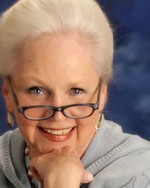 Karen Mains “My worldview has been determined by radical experiences that pulled me outside my comfort zone. I was a naive, underexposed, suburban, conservative Christian, who had absorbed a faith strongly influenced by culture and Western assumptions—I was an economically, racially, class-influenced and woefully ignorant human being.”
BOOK CORNER 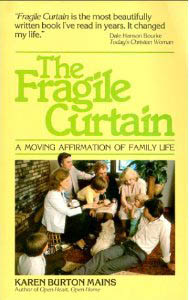
The Fragile Curtain
The Fragile Curtain by Karen Mains won the Christopher Award given for works that exemplify the highest values of humanity. In this deeply moving book, we join Karen on her very personal journey through the crowded refugee warehouses of the world. She went to write about the pain and suffering of these people. Instead they showed her the meaning of her own life. The sacredness of family. The miracle of love. The hope of birth—and death. Karen dares us all to look at our own lives; to assess the good—and the bad. To celebrate the joy and the blessing of family life. To be thankful that despite sorrow and suffering we dare to begin again.
“The Fragile Curtain is the most beautifully written book—Christian or secular —that I’ve read in years. It is full of wisdom and emotion and touched me so deeply it changed my life. This book is a classic, a book to be read and reread and given to friends.” —Dale Hanson Bourke
If you order a copy (paperback) from Hungry Souls for $10.00 plus $3.95 shipping and handling, Karen will gladly autograph your copy. You may make your check payable to “Hungry Souls” and mail it to:
|
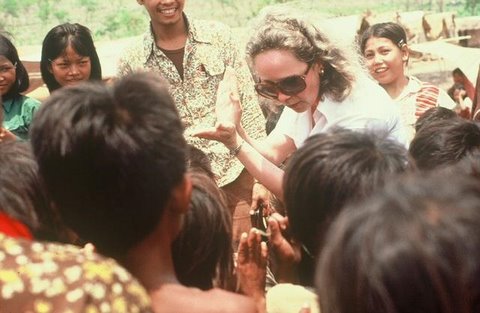 Teaching Vietnamese refugee children “Six Little Ducks”
Teaching Vietnamese refugee children “Six Little Ducks”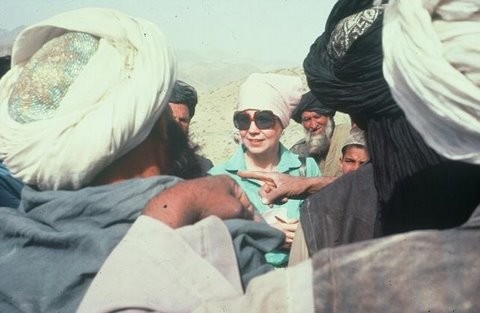 Interiewing Afghanistans who had fled over the border into Pakistan
Interiewing Afghanistans who had fled over the border into Pakistan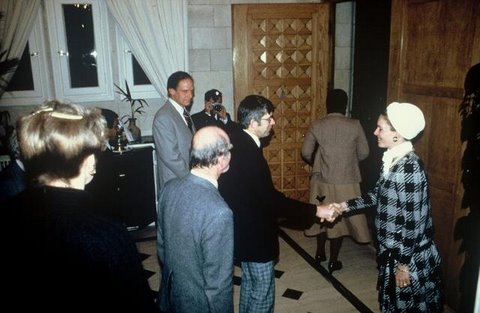 Waiting in line to say good bye to Queen Noor.
Waiting in line to say good bye to Queen Noor.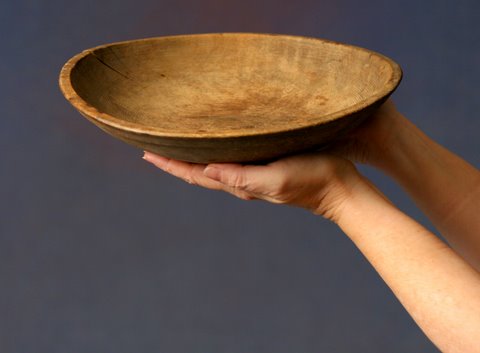 The Begging Bowl: A symbol of the hunger for God that
The Begging Bowl: A symbol of the hunger for God that